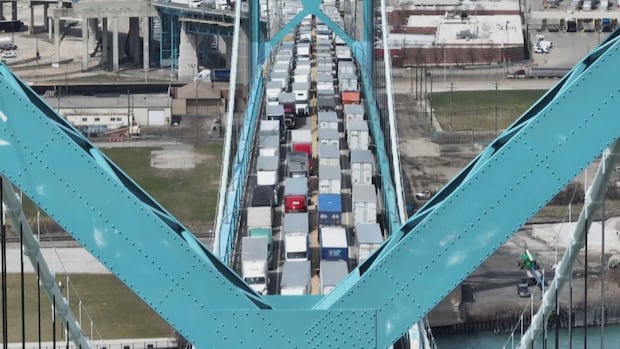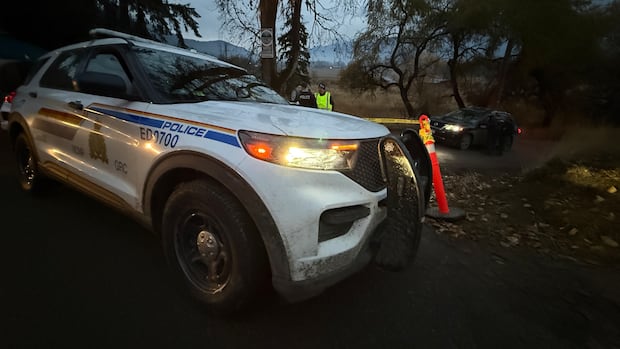Canadian border officers were not able to review potential security flags related to truck drivers crossing into the country from the United States last week, according to their union.
Officers were forced to manually process travellers after the Canada Border Services Agency (CBSA) experienced a system outage that started Sept. 28.
The outage was resolved within 48 hours, according to the CBSA, but led to delays of up to 38 hours for commercial trucks entering parts of Canada during the week.
“When the system is down, we’re not getting the information on potential security lookouts or flags,” said Mark Weber, the national president of the Customs and Immigration Union, which represents CBSA officers.
Weber said by the time information was available to officers, trucks would have already crossed into the country.
“So, yeah, really concerning in that respect,” he said.
Minister orders report within 30 days
Weber echoed calls from the Canadian Trucking Alliance (CTA) for the government to invest in upgrades to the CBSA’s IT infrastructure.
He said the system officers use is from the ’90s and is prone to outages.
“I think this was one of the worst ones we’ve seen,” said Weber.
CBC News has contacted CBSA for comment.
Canada’s public safety minister has ordered the CBSA to provide a report to government within 30 days that explains what happened, and a plan to prevent future outages.
Truckers looking to enter Canada from the Blue Water Bridge or Ambassador Bridge faced hours-long delays as a result of a now-resolved systems outage that saw staff unable to process electronic forms. Many in trucking are saying delays are growing more frequent and want to see systems improved.
“With the continued unpredictability around the Canada-U.S. trade war, and the unknown posed by upcoming CUSMA (Canada-U.S.-Mexico Agreement) negotiations, ensuring stability from a trade and cross-border supply chain perspective remains imperative,” said CTA’s director of policy and industry awareness Lak Shoan.
“We hope this report will finally identify and address the long-standing concerns from the trade community, as this type of disruption simply cannot happen again.”
The CBSA said the outages were caused by “unforeseen technical problems during routine system maintenance” and “not the result of a cyberattack.”
Chaos for cross-border logistics
Steve Ondejko, who runs Onfreight Logistics out of Tecumseh, Ont., said these outages are rare but costly when they occur.
One of his drivers sat idled on the American side of the Ambassador Bridge in Detroit for five hours, hitting his daily limit when he got across in Windsor, Ont.
That meant the company needed to send another driver to the truck to pick up the driver and his load, adding to the company’s costs.
“For us, it was a huge problem adding multiple hours of multiple trucks and created, certainly, operational havoc,” said Ondejko, whose trucks can cross the border up to 60 times a day.
He said these types of outages aren’t common but can put companies like his days behind when they do happen.
“A costly catch up for us, certainly, because it’ll mean more hours to do the same work,” said Ondejko, who organizes truckloads of food and auto supplies out of the Windsor region and into the United States.
He pointed to the nearly completed Gordie Howe International Bridge in Windsor as an example of a great investment Canada has made to smooth out the supply chain with the United States.
“If you got a fantastic bridge, park all the trucks on, it’s not very good. We need to move the trucks through and technology becomes a certainly a bigger part of that,” said Ondejko.







